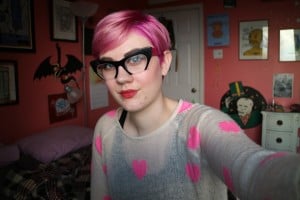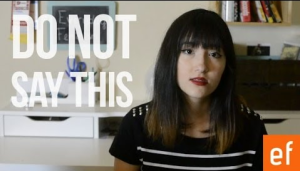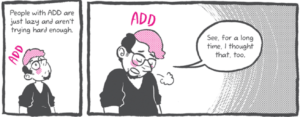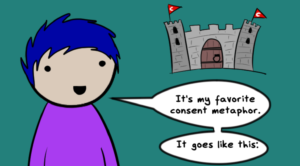Originally published on Fem2pt0 and cross-posted here with permission.

Credit by Dave Bledsoe via Flickr and the Creative Commons License
About 10 years ago, I moved in with my boyfriend at the time. Should have been exciting, right? No. While things between us were good at first, he quickly turned abusive. Arguments rapidly escalated as he punched me in the stomach, kicked me and tried to choke me. I knew I should leave. But it wasn’t easy. I loved him. I worried if I could financially support myself. I was embarrassed and ashamed.
But one thing I knew for certain. If I ever became pregnant, I’d get an abortion.
In August 2012, the Guttmacher Institute released a report outlining the reasons why women have abortions. According to their findings, many women obtaining abortions experienced “disruptive” life events, such as unemployment, moving or domestic abuse. Domestic violence survivors are 7 times more likely to have an abortion.
As a domestic violence survivor, I’m not surprised by this revelation. Domestic abuse throws your life into an unimaginable, tumultuous nightmare. You have no security and feel like you’re losing your sanity. Abusers maintain control physically, emotionally, financially and psychologically. They may control finances, rape, refuse to wear condoms during sex or coerce women into not using birth control.
During our relationship, I never had an abortion as I never became pregnant. I didn’t (and still don’t) want children. But even if I had, I would never have wanted to raise a child in such a toxic and abusive environment. I’ve been forever grateful for the right to choose abortion.
1 in 3 women will have an abortion in her lifetime. People get abortions for myriad reasons. Renee at Abortion Gang writes:
“Abortion is different for everyone. Each abortion is like stripes on a zebra; while on the surface they may seem similar, no two experiences are exactly the same.”
Yet far too many people discredit, devalue and judge a woman’s reasons for choosing abortion. Who are we to judge a woman’s autonomy over her own body?
In her memoir Intimate Wars, reproductive justice activist Merle Hoffman recounts “an exercise given to abortion providers at a conference” asking who should get an abortion:
“If you had only one abortion left to give,” we were asked, “to whom would you give it? A woman with HIV, a twelve-year-old, a forty-eight-year-old, a woman who was raped, a woman who wants to finish her PhD? What about the woman who just doesn’t want a baby?”
“The catch, of course, is that all of these reasons for making the choice to have an abortion are equally valid. Why a woman makes a decision to have an abortion is not the deciding issue. She is making the choice that is right for her, and that is what matters.”
Anti-choice legislators continually try to mandate abortion reasons or attempt to flat-out ban it. The hateful and disgusting comments about “legitimate rape” spewed by misogynist Todd Akin spurred countless discussions on rape exceptions for abortion. Some say they’re bullshit. That they imply some abortions are more deserving or justified than others. Others see them as a semblance of neutral territory that at least both sides — pro-choice and anti-choice — tend to agree on.
Here’s the thing: rape and incest exceptions are bullshit.
We in the pro-choice community and reproductive justice movement should stop being placated by rape and incest exceptions. Anyone should be able to access abortion — which is healthcare — at any time for any reason. No one should be questioned or examined or scrutinized in order to have a routine medical procedure.
Feministing’s Maya Dusenbery, who asserts the power of sharing abortion stories and cautions against “the danger of the single abortion story,” explains “why rape exceptions and abortion stereotypes are harmful”:
“The standard “rape, incest, and life endangerment” exception language is part of this broader tendency to categorize abortion into types. The heart-breaking fetal anomaly. The teenager who didn’t know any better. The poor mother who can’t afford another kid. The condom that broke. We create these stereotypes because we want to put a face to abortion, and there aren’t enough real women telling their stories–for all sorts of understandable reasons…
The point, to me, has always just been the humbling reminder: You don’t know anything about other people’s lives.The point is to show that we can’t categorize abortions into these different types, because every single woman’s reason for getting an abortion is absolutely unique.”
While she understands the tendency to discuss them, The Nation’s Irin Carmon asserts why “rape exceptions aren’t legitimate” and how they imply justification of some abortions over others:
“It’s not that I don’t understand why people, including pro-choice organizations, like to talk about rape or life endangerment exceptions. They illustrate how incredibly cruel opponents to abortion are, how divorced they are from the difficult and knotty circumstances of real life. And they help people who can’t understand what kind of woman has an abortion — despite that real 1-in-3 statistic — realize that all kinds of women have abortions, including ones they find sympathetic. Women who have abortions have been so demonized that storytelling helps make that essential empathic leap that so many people are missing. But as Akin shows, once you start haggling over reasons, you’re giving up half the fight — which is that this is about bodily autonomy and respect for women’s ability to determine their own lives.”
When we talk about why people have abortions, another insidious problem emerges. Too many pro-choice supporters utter the annoyingly judgmental words, “I’m pro-choice, BUT I would NEVER have an abortion.” No, just no. There is no “but.” Why even add that bullshit disclaimer?
Rh Reality Check’s Amanda Marcotte explains why the phrase “I’m pro-choice, but… is so devastating:
“I’m pro-choice, but I would never have an abortion” undermines the pro-choice movement you claim to support. It dehumanizes women who have abortions, and reinforces the stereotype that women who have abortions are irresponsible, immoral, or slutty. After all, what’s the point of making it clear that you would never have an abortion? It’s about distancing yourself from them, implying that you’re not like them. That you’re more sexually pure or more responsible. Which feeds into the anti-choice narrative about abortion: That it should be banned because the kind of people who need that service are bad people who need to be punished for their sexual choices.”
Adding the “but” implies your assumption that people who get abortions don’t live up to your oh-so-high moral standards. If you truly support reproductive choice – which is what you declare when you say you’re pro-choice – you should support the full spectrum of reproductive options, in all situations. It’s about supporting bodily autonomy, not passing judgment on the choices women make.
Now that doesn’t mean if you’re pregnant and you choose not to have an abortion that you’re somehow not pro-choice. I’m saying that we must respect all reproductive choices equally: abortion, adoption, having a baby.
There shouldn’t be an abortion hierarchy. But that’s precisely what happens when we agree to rape and incest exceptions and tell people we support choice but would never personally get an abortion ourselves.
No one should ever have to justify their medical decisions. Obtaining an abortion is a conversation that should transpire between a patient and their medical care provider. No one else. Period.
So why do we even need to know or talk about women’s reasons for getting an abortion?
The Nation’s Emily Douglas argues we can’t and shouldn’t categorize abortions. But she does believe the Guttmacher study, and knowing why women have abortions, is important. It’s “not to pit the women who deserve abortions against unworthy ones.” It’s about understanding the complexities in women’s lives:
“There’s a danger that seeking to understand more about the circumstances of women’s abortion choices reiterates the same power dynamic we’re fighting against…But those of us who support women’s autonomy, in all circumstances, can’t let our commitment to non-judgment interfere with getting a fuller picture on the lives of women who have sought abortions. As anyone who has been to an abortion speakout knows, there’s a lot to learn.”
So does it ultimately matter why people get abortions?
No, no it doesn’t. Abortion should be accessible, affordable and on demand, without apology. But then again, yes, it does matter.
Until we achieve full reproductive justice and access for all, we must continue to advocate for abortion. And one salient and powerful way to do that is for people — I know I say women throughout a lot of this but women aren’t the only ones getting abortions, trans men and genderqueer individuals who don’t identify as female do too — to share their reasons for choosing abortion.
The 1 in 3 Campaign, I’m Not Sorry and I Had an Abortion all compile personal abortion stories, showcasing the diverse range of experiences. No one should talk about their abortion if they don’t want to; it’s private and their personal business. But it’s important for those who do feel comfortable to share their experiences and circumstances. Telling abortion stories reduces stigma. It lets people who have had an abortion know they’re not alone.
People’s personal stories are far more powerful than statistics. Abortion stories help dispel abortion myths and stereotypes. They can foster empathy, allowing people to envision themselves in another person’s situation. Those who oppose abortion or oppose it certain scenarios, might begin to understand why someone else would make that choice. It’s easy to vilify a stranger. It’s much harder when you hear their own words.
We never know the struggles someone else faces. We never know people’s private pain. I share my own story of abuse so people understand that this can happen to anyone. While I eventually left my abusive partner, knowing I had the safety net of an abortion gave me strength and peace of mind. It comforted me knowing I could have an abortion if I ever needed it.
Everyone should have that right. Without question.
Megan Kearns is a feminist vegan blogger, editor and freelance writer. She blogs about gender, media, food and politics at The Opinioness of the World, a feminist vegan site she founded. A Bitch Flicks Editor and Staff Writer, Megan analyzes film and television through a feminist lens and writes about gender, media and reproductive justice as a Fem2pt0 blogger. Megan’s work has also appeared at Arts & Opinion, Feminist Magazineon KPFK radio, Feministing’s Community Blog, Italianieuropei, Open Letters Monthly, A Safe World for Women and Women and Hollywood. You can follow her on Twitter @OpinionessWorld.
Search our 3000+ articles!
Read our articles about:
Our online racial justice training
Used by hundreds of universities, non-profits, and businesses.
Click to learn more
Most Read Articles
- « Previous
- 1
- …
- 30
- 31
- 32



















